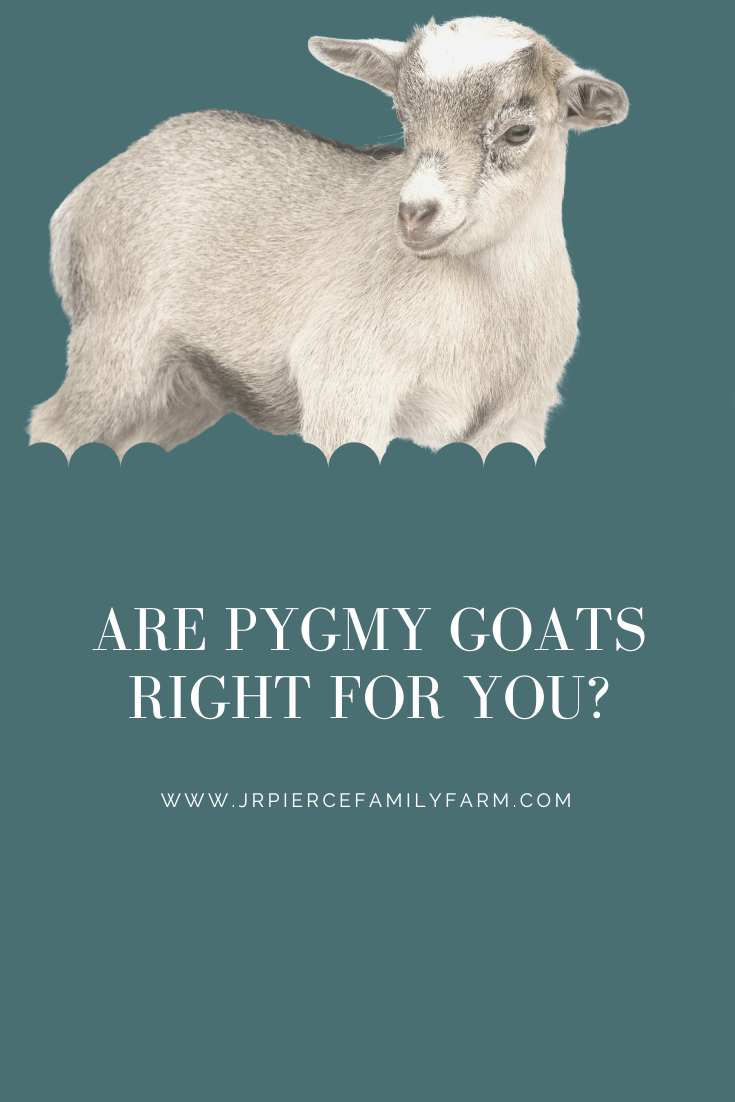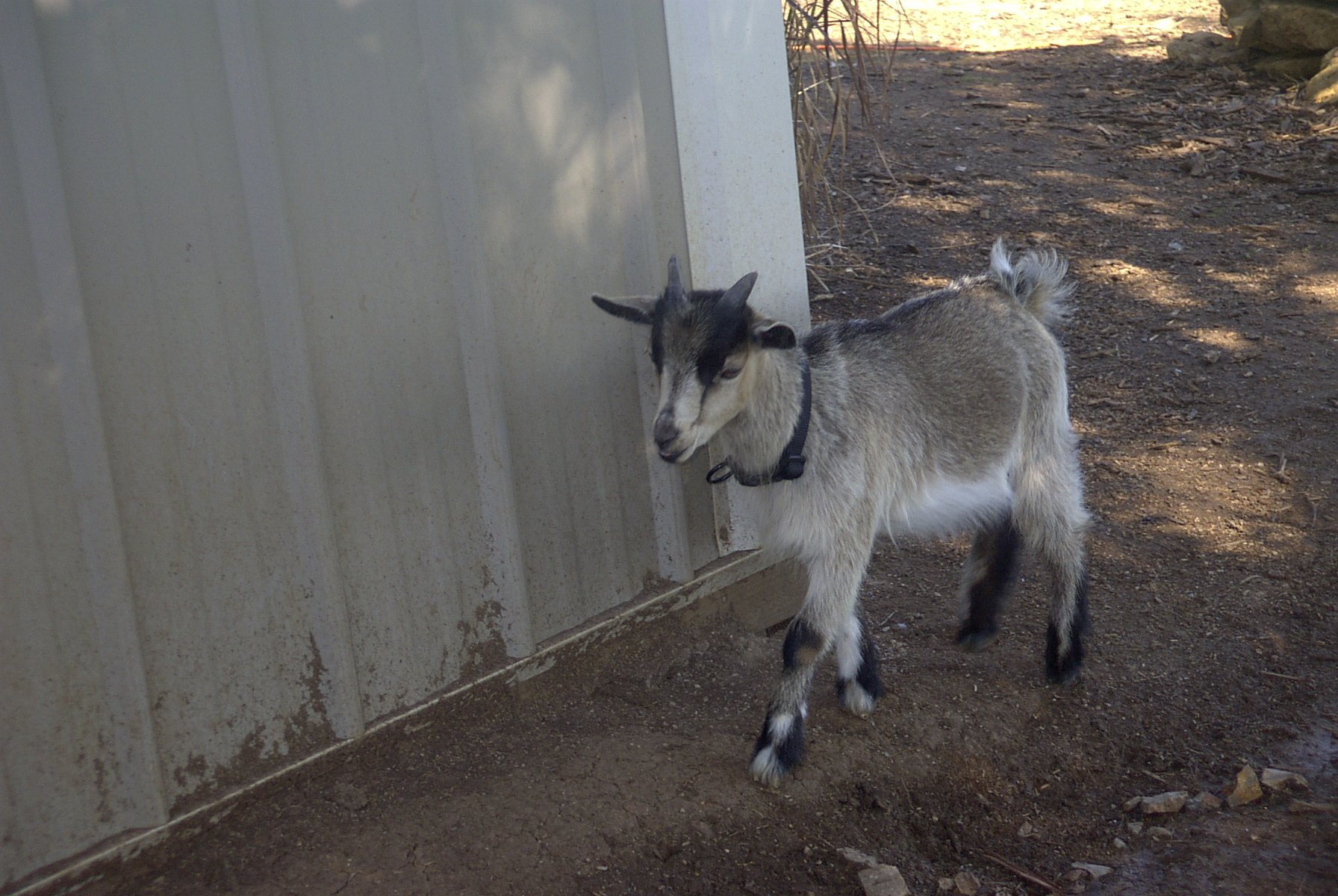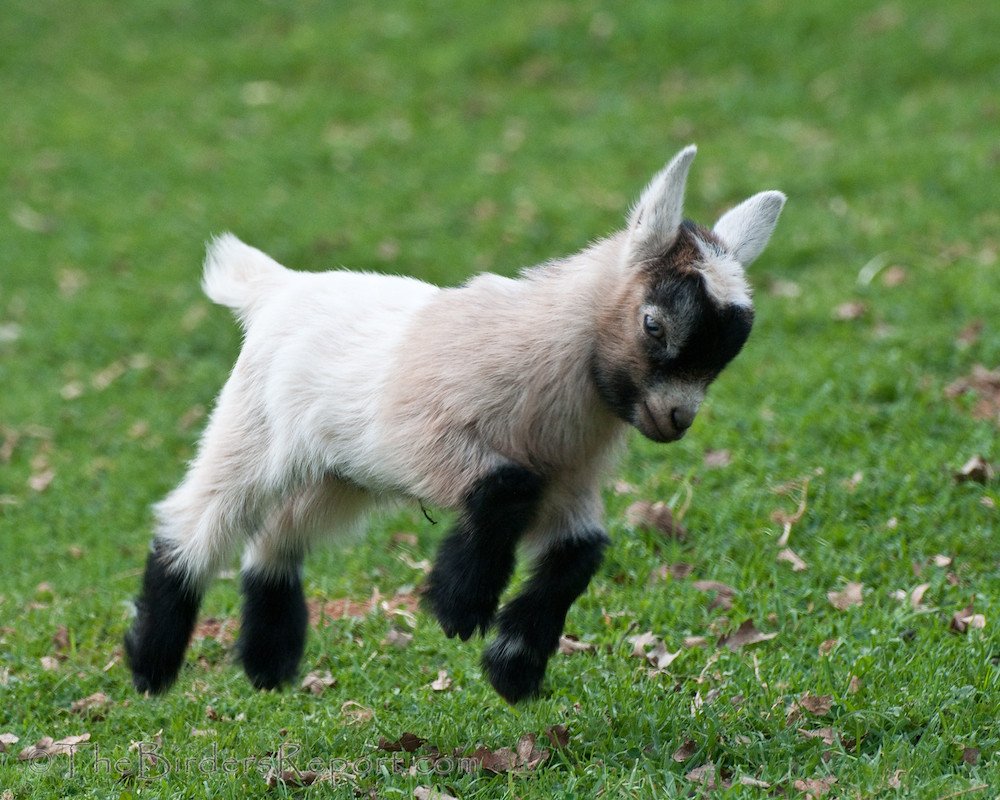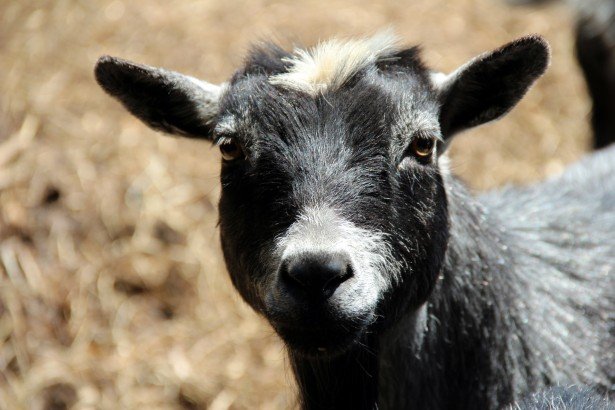Are Pygmy Goats Right For Your Farm?
Are you thinking about getting started with goats?
If so, you're probably well aware of the many benefits of raising goats. They're great grazers, they're friendly, and let's face it - who doesn't find the sight of a fluffy little kid bouncing around the yard absolutely adorable?
While there are lots of decisions to be made in raising goats, one of the biggest choices you'll have to make is which breed. Pygmy goats are some of the most popular in the United States, widely found in petting zoos, backyards, and commercial farms all over the country.
But are they right for you?
In today's guest post, written by our good friend Anika, we'll be walking you through the pros and cons of Pygmy goats so you can decide whether this breed is right for you.
Let's get started.
**J&R Pierce Family Farm is a participant in the Amazon Services LLC Associates Program, an affiliate advertising program designed to allow sites to earn advertising fees by linking to products on Amazon. I often link to Amazon when recommending certain products, and if you choose to purchase, I may earn a small percentage of the sale. It costs you nothing extra, and all recommended products are ones that I personally vouch for.**
What Are Pygmy Goats?
Pygmy goats are considered a dual-purpose goat breed and are known for their small, compact size. While they are a dual-purpose breed used for milk and meat, they can provide much more than these two products. Here are a few reasons to raise pygmy goats:
Their gregarious nature and playful disposition help to make them excellent companion animals, for livestock and humans alike.
Due to their small stature, pygmy goats are also commonly used for FFA and 4-H projects.
Despite being one of the smallest goat breeds, pygmy goats are outstanding browsers and can aid in the removal of weeds and unwanted brush.
These goats are more commonly used for ecological management.
Here’s a video of pygmy goats to convince you even more:
Pygmy Goat History and Origin
Pygmy goats originated in Africa and were known as the Cameroon Dwarf Goat. These African goats became exhibits at zoos in Sweden and Germany. The Cameroon Dwarf goats were then exported to England, Canada, and the United States.
When these goats arrived in the United States around 1959, they were used in zoos and medical research, and some went to private farmers. The offspring of these goats became what we know as the pygmy goat today.
In 1976, the National Pygmy Goat Association (NPGA) was founded to protect the pygmy breed standard and keep a record of the breed lineage. Pygmy goats can be registered through this association.
What Are Pygmy Goats Used For?
Pygmy goats can be used for a variety of purposes. Their uses range from production to companion to ecological. Most notably, pygmy goats are a dual-purpose production breed used for meat or dairy, but their uses have greatly expanded over the years.
Raising Pygmy Goats for Meat and Dairy
Pygmies are naturally stocky and have heavy muscling, making them suitable for meat production. Many homesteads and farms like to use pygmies for meat due to their small, manageable size.
These goats are also efficient dairy producers. Although pygmy goat teats are shorter than most dairy goat breeds, they are still adequate at producing milk. Working with their smaller udders can be a bit of a challenge, but their milk has a very high butterfat content.
Showing Pygmy Goats
Pygmies are often used as 4-H or FFA project animals because they are easily handled by young children. Their smaller size allows students to keep these project animals without having to worry about large housing expenses. They are also very food motivated, making them easily trainable and suited for meat goat shows.
Companion Animals
One of the most popular uses of pygmy goats today is as companion animals. These goats are used as pets for humans, and as companions for livestock and equine. They have even been known to keep lonely zoo animals company!
As pets, pygmy goats are playful and love attention from their human friend. These goats are easy to handle, very responsive, and do not require elaborate housing. Due to their playful nature, they can become bored easily and cause mischief if not provided enough stimulation.
Since pygmy goats are herd animals, they do have to be housed with other herd animals for their overall well-being. Other animals don’t necessarily have to be goats though, they could be sheep, cattle, donkeys, or horses!
Pygmy goats can serve an ecological role too. They make for excellent weed management due to their browsing ability. They enjoy eating those unwanted weeds, brushes, and shrubs. They especially love to eat poison ivy, which is not poisonous to goats.
Due to the pygmy goat’s small size, they are very easy to manage if used for weed control. With portable fencing or panels, you could set up pygmy goats wherever you need on your homestead to assist in land management. And the pygmies will leave with a full stomach.
These smaller breed goats are also being used in some unique ways. Goat yoga has been gaining popularity around the world, and pygmy goats are the perfect size to assist humans in their various yoga poses and provide lots of entertainment while they’re at it!
Are Pygmy Goats Good Pets?
Pygmy goats make excellent pets. They are very responsive to humans, can be trained to various commands, and love to play. They are also content with hopping up on your lap and taking a nap.
These goats are highly trainable as well and can learn various commands if worked with properly. They enjoy being stimulated, and love to play. If kept as a pet, they should be provided with places to jump and run.
While pygmy goats are trainable, they still will exhibit goat-like behaviors, which can include head butting. Usually, this behavior is playful, but can sometimes be territorial if dealing with a doe and her kids, or a buck during mating.
If you are looking to keep a pygmy goat as an inside pet, you will have to get a diaper or constantly clean up after them! They can be trained to urinate outside with consistency, but they, unfortunately, cannot be trained on when to defecate.
How Big Does a Pygmy Goat Get?
Pygmy goats are one of the smallest goat breeds, alongside the Nigerian Dwarf goat breed. They will stay on the smaller side, with sizes ranging between the does (females) and the bucks (males)/wethers (castrated males).
Pygmy bucks and wethers can reach up to 23 inches at the withers and does can reach up to 22 inches at the withers. The withers is the ridge between the shoulder blades, which is the tallest point on the animal.
Bucks and wethers can reach approximately 80 pounds maximum but usually fall between 60-70 pounds. Does can reach approximately 75 pounds maximum, but usually fall between 50-60 pounds.
Pygmy goats are known for their long beards and manes. Bucks and wethers will grow longer beards, while does’ beards are usually sparse or non-existent. They are medium hair length, with their coats changing seasonally.
Pygmy goats come in a variety of colors, including black, agouti, and caramel. These goats will often have patches and belly bands that are white or black, and tails that are accented white or black. They can also have a dorsal stripe.
Do Pygmy Goats Stay Small?
Since pygmy goats descended from the Cameroon dwarf goat, they do stay small even after reaching maturity.
They reach weights of about 50 – 70 pounds and usually do not exceed that, and 23 inches at the withers is the tallest you will see a pygmy goat.
What is the Lifespan of a Pygmy Goat?
Pygmy goats can live long and happy lives in captivity if sufficient health regimes are followed.
Usually, pygmy goats tend to live for an average of 8-12 years. However, if they are in good health, they have been known to live up to 20 years!
Do Pygmy Goats Have Any Health Issues?
Pygmy goats are not known to have any health issues that are specific just to their breed. Like all goats, pygmies are subject to several health issues. Some of these health issues can include bloat, coccidia, tetanus, scrapie, anemia, pneumonia, and enterotoxemia.
Bloat
Bloat is a serious illness that can happen to any ruminant and can become deadly. Goats are known as ruminants, meaning they have a four-chambered stomach. Gas can become trapped within the ruminant digestive system, usually due to a goat overeating grain.
Coccidia
Coccidia is a type of bacteria that can be passed through a goat’s fecal matter. Kids are usually the most vulnerable to these bacteria. This bacteria affects the intestinal tract of goats and can cause lethargy and scours.
Tetanus
Tetanus is another very serious disease in goats that is caused by the Clostridium Tetani bacteria strain. It is also known as “lockjaw” and once contracted, death will soon follow.
Scrapie
Scrapie is a fatal disease that is passed from the doe to the kid during birth. It is a slow-developing disease that attacks the central nervous system of goats.
Anemia is usually caused by a high parasite load in a goat. The goat experiences a drop in their red blood cell count resulting in several symptoms including scours. Anemia will result in pale eyelids, which is a good indicator of a high parasite load.
Pneumonia
Pneumonia is a treatable illness caused by bacteria, viruses, or environmental conditions. Extreme weather changes without adequate shelter can be a factor in goats contracting pneumonia. Symptoms can include fever and respiratory issues.
Enterotoxemia
Enterotoxemia is also known as the "overeating disease". This disease is caused by the Clostridium Perfringens bacteria and can result in sudden death.
Bladder Stones
Bucks or wethers can also develop bladder stones. This causes a blockage in the urinary tract system. This obstruction does not allow the males to urinate, which can become deadly if left untreated. These stones are usually caused by overeating too much grain without roughage.
Preventing Disease in Goats
Luckily, most of these diseases or illnesses can be prevented with immunization and proper husbandry. Preventative vaccines, de-worming schedules, and routine pen maintenance can limit most of these diseases from ever hitting your herd!
The CD/T vaccine is used to prevent enterotoxemia and tetanus. It should be given yearly, and kids should receive two vaccines at 6-8 weeks and again at 10-12 weeks.
Proper deworming schedules are also very important in any goat herd to prevent anemia. A veterinarian can help to guide goat owners as to when dewormers should be given and what types of dewormers are best.
Pros and Cons of Raising Pygmy Goats
Raising pygmy goats can include many pros, depending on what you are raising your goats for.
If you are adding pygmies to your farm or homestead for production, their meat is considered lean and has much less cholesterol than other red meats. And their milk has a high butter fat content, which offers a great taste and makes suitable milk for cheese!
There are many pros to having pygmies as an ecological component of your homestead. Their browsing abilities can help to save you both time and money. They can clear unwanted brush and weeds, or just maintain your acreage.
A huge pro of the pygmy goat is its character. These goats make excellent companions and pets. They are playful, cuddly, and trainable. They crave human attention and love to be doted on.
There are some cons to be considered when adding pygmy goats to your herd or homestead. These can include their behavior if they do not receive enough stimulation and their naturally curious disposition, which can sometimes get them into trouble.
These goats require a lot of attention and stimulative activities, or they may get bored and try turning to destructive behaviors.
How to Care for Pygmy Goats
Caring for pygmy goats is like caring for any other goat but on a much smaller scale! Less feed, smaller housing requirements, and less space are required for pygmies.
Housing Requirements
Depending on your geographical location or weather patterns, pygmies at least need a 3 sided structure to shelter from the elements. These goats do not like getting wet, and damp conditions can lead to pneumonia.
Diet
A pygmy’s diet will depend on what they are being used for on your homestead. If the pygmy will be used for meat, then their diet should consist of meat goat pellets or grain, along with roughage.
If the pygmy goat is being used for dairy, you will want to consult your veterinarian to find out what feed will be best for maximum milk production.
When pygmy goats are being kept as pets or companion animals, they can live on just roughage without grain or pellets.
It will be important to figure out what your goats will have access to on your homestead, and if additional hay/roughage should be provided to them.
Routine Care
Having a veterinarian established will be crucial to ensuring the goats' safety and well-being. A veterinarian will be able to recommend and prescribe treatments and preventatives as needed to ensure the goats live happy and healthy lives.
Pygmy goats should receive proper immunizations and deworming recommended by your veterinarian. These vaccines usually include CD/T, rabies, and mineral shots as needed. Seasonal deworming should also be included in your routine goat care.
Like other livestock animals, animal husbandry plays a big role in the overall health of these goats. Ensuring that the goats always have access to clean water and that their shelter is kept clean with adequate bedding will be essential in the care of a pygmy goat.
Where to Find Pygmy Goats
Pygmy goats can be found on local farms or homesteads, county fairs, breeders, and livestock adoption facilities. If you are looking to add pygmy goats to your homestead or farm, try looking locally first.
Some websites provide a directory of US pygmy goat breeders, and some sites provide adoption facilities that may have pygmy goats.
What to Look For When Adding Pygmy Goats to Your Farm
If you are considering adding pygmy goats to your farm, what to look for will depend on what you want to use the goats for.
If you are planning on using pygmy goats for production purposes, you may want to look for registered pygmy goats to know that their lines are pure, and you will be getting a purebred pygmy.
This is also true for 4-H or FFA projects. Meat goat shows will only allow you to enter if the goat is registered. You may want to look for certain color patterns if you are conducting a genetics project or certain dispositions for goat shows.
If you are searching for a pet, you may consider looking for a kid to raise so that you can become bonded with the goat from an early age.
Final Thoughts
Pygmy goats can make an excellent addition for a variety of reasons! Their small size sets them apart from other goats and makes their overall care much more manageable.
Whether you want to use pygmies for production, ecological management, as companions, or to just make your next yoga session a little more entertaining, these goats will absolutely add some character to your homestead with their playful and lively personalities.
Want to learn more about farming? Be sure to check out these featured articles!
Subscribe to our email newsletter for regular tips and tricks on homesteading and farming – wherever you are. You can also follow us on Instagram (@jrpiercefamilyfarm) and Pinterest (J&R Pierce Family Farm) for frequent updates. Happy homesteading!







